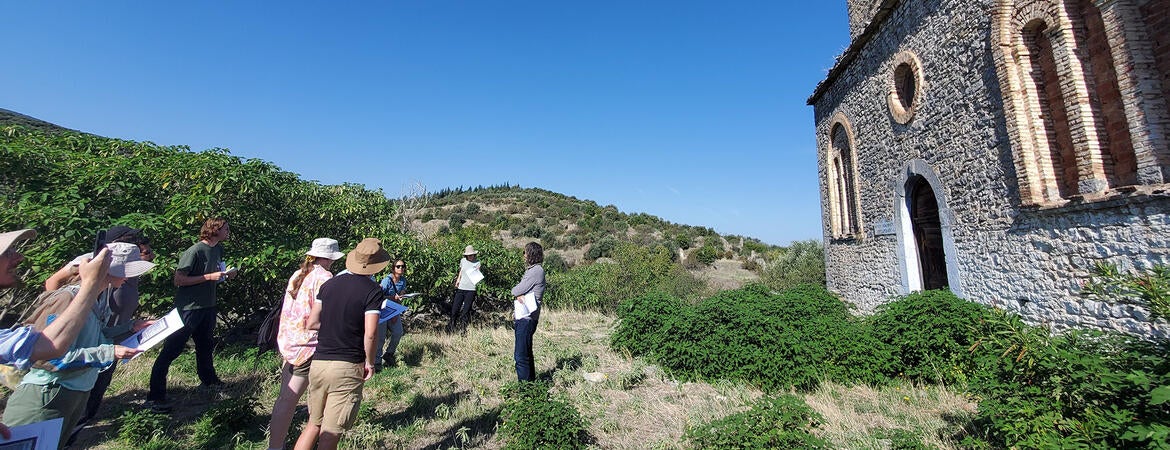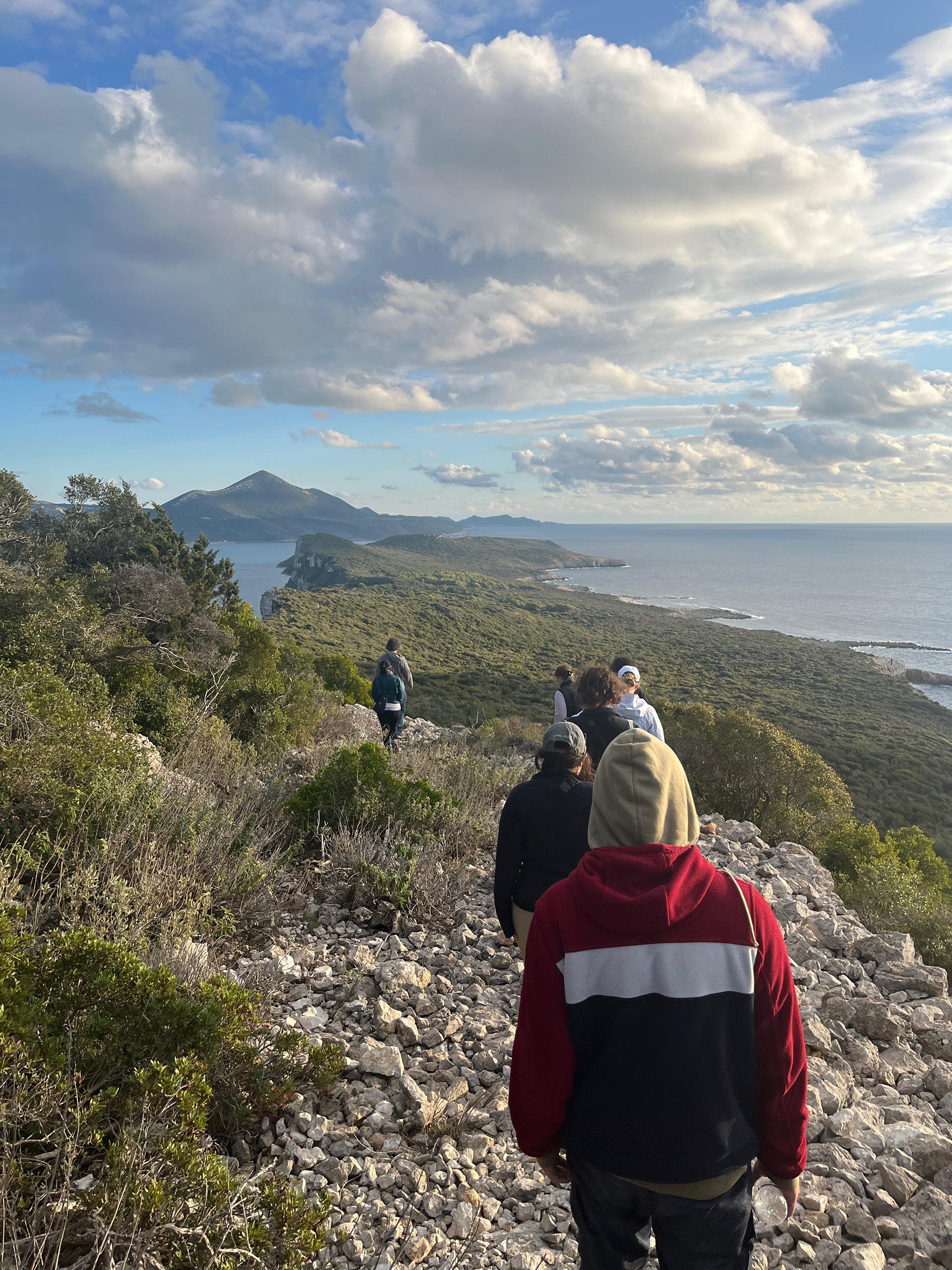College of Humanities, Arts, and Social Sciences

Denver Graninger, associate professor of history at UC Riverside, is visiting one of Greece’s most prestigious institutions of classics, the American School of Classical Studies at Athens (ASCSA) as the Andrew W. Mellon Professor of Archaeology. Graninger, who started his three-year appointment in July 2024, directs the School’s Regular Member program, which provides an intensive, academic year-length introduction to ancient Greek topography, monuments, and culture for student members pursuing doctorates in classics, archaeology, ancient history, and related fields in graduate programs in the United States and Canada. Admission with fellowship is competitive and applicants regularly come from leading programs."
The core practice of the Regular Program is an autopsy of the topography and monuments of the ancient Greek world. Students visits the vast majority of archaeological sites and museums on the Greek mainland in extended 10 to 12-day trips over the fall. The winter is focused on Athens and Attica, with three days a week on-site and in museums in the city and surrounding countryside. Spring is less structured and gives students the chance to advance their dissertation projects. While Prehistory to Late Antiquity is privileged in the curriculum, there is engagement with later periods of Greek history.
“My appreciation for the quality of the organization and its outsize impact has deepened over the years,” Graninger said. “It is humbling and beautiful to be able to return now in this role.”
Graninger’s three-year term as Andrew W. Mellon Professor (with the potential for one renewal) will run from 2024 through 2027, after which he will resume his role as associate professor of history at UCR.
Graninger’s close ties with the school span more than two decades, beginning in 2002 when he attended as a Regular Member and Michael Jameson fellow. “My time at the School has changed who I am as a scholar — after nine months here as a graduate student, I was never able to look at anything in the ancient Greek world in the same way.”
Graninger returned to the ASCSA in 2009 as Rhys Carpenter Faculty Fellow, focusing on research and teaching throughout the academic year and, in the summer of 2016, as the Gertrude Smith Professor and organizer of a six-week summer program. In 2013, Graninger became a member of the School’s Managing Committee, serving on Admissions and Fellowships and, most recently, on the Executive Committee from 2021 through 2024.
According to Graninger, the School has shaped his career and approach to research, teaching, and collaboration with colleagues.
“I was motivated to apply because it has always seemed like the best possible teaching and research environment for me,” he said. Graninger submitted his application in February 2023, and the Managing Committee approved his appointment as the new Mellon Professor in spring and summer 2023.
Graninger joined the Department of History at UCR as an assistant professor in 2012, teaching and mentoring undergraduate and graduate students.
“Working in a history department has helped me to be more open to seeing how my research connects with that of my colleagues, who are working within different chronological and geographical ranges. It is a stimulating setting and I have learned so much from them,” he said. “All of that has, in turn, made me a better scholar and teacher.”
At UCR, Graninger also became involved in different areas of the university, serving as a member of the faculty advisory board for UCR’s Undergraduate Research & Creative Activities Symposium and as a member and chair of the UCR and UC-wide Senate Committees for International Education which oversees study-abroad programs, foreign exchange programs, and international research to serve UC students.
“My work in the Senate on the IE side has been similarly horizon-broadening and helped me to appreciate further both how transformative international education is for students and how policy and politics prepare the ground for those types of experiences,” he said.
At UCR, Graninger also organized study abroad programs in Athens, providing a platform for students to cultivate international collaboration and learning. “Many of my UCR students had not spent a whole lot of time outside of Southern California, but coming to Athens and living here for a month changed them in a profound way, and gave them the confidence to explore further,” Graninger said.
Prior to joining UCR, Graninger was Professor and Director of the American Research Center in Sofia (ARCS), Bulgaria, from 2010 to 2012, where he contributed to the expansion of its academic program and educational trips through course development, archaeological field school launches, which included collaboration and mentorship of graduate fellows who studied a wide range of disciplines. Graninger’s time at ARCS was an invaluable experience that has influenced his new role.
“I really learned to be a generalist, to invest time in our fellows and point them to local resources, and to engage them as scholars and support them as people,” he said. “I draw on that experience every day in Athens.”
As the new Mellon Professor, Graninger intends to expand ASCSA’s Regular Program in three areas: a local context focused on research within the school; a peer-driven one that invites collaboration and connection with international archaeological students in Athens as well as graduate students from various Greek universities; and a context intended to expand professional development for students.
“I aim to be open-minded, embracing what is traditional in the program, but am also ready to try something new and to make the program meet the professional needs of our students, which are in the midst of a significant shift,” he said.
During his term, Graninger also looks forward to continuing his current book project, a social history of Larisa, Greece, from the fifth century BCE to the second century CE, testing new research methods, and studying inscriptions and sites more closely.
“I want to do the job well, to support our students, and help them to advance their research and to spark among them a deeper love for Greece in all of its complexity. There is enormous professional satisfaction in that,” Graninger said. “And I have so, so much to learn from the students, who are bright, motivated, and intellectually diverse, and from Greece.”

FEATURED PHOTO. Denver Graninger and students discussing the history of Palaios Platanos, an abandoned village in east Thessaly, Greece.